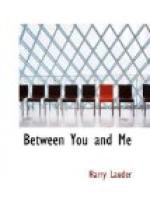A man must do his duty as he’s made to see it. And that’s what I tried to do in the war. If I stepped on any man’s toes that didna deserve it, I’m sorry. I’d no be unfair to any man. But I think that when I said hard things to the folk of a toon they were well served, as a rule, and I know that it’s so that often and often folk turned to doing the things I’d blamed them for not doing even while they were most bitter against me, and most eager to see me ridden oot o’ toon upon a rail, wi’ a coat o’ tar and feathers to cover me! Sae I’m not minding much what they said, as long as what they did was a’ richt.
All’s well that ends well, as Wull Shakespeare said. And the war’s well ended. It’s time to forget our ain quarrels the noo as to the way o’ winning; we need dispute nae mair as to that. But there’s ane thing we maun not forget, I’m thinking. The war taught us many and many a thing, but none that was worth mair to us than this. It taught us that we were invincible sae lang as we stood together, we folk who speak the common English tongue.
Noo, there’s something we knew before, did we no? Yet we didna act upon our knowledge. Shall we ha’ to have anither lesson like the one that’s past and done wi’, sometime in the future? Not in your lifetime or mine, I mean, but any time at a’? Would it no be a sair pity if that were so? Would it no mak’ God feel that we were a stupid lot, not worth the saving?
None can hurt us if we but stand together, Britons and Americans. We’ve a common blood and a common speech. We’ve our differences, true enough. We do not do a’ things i’ the same way. But what matter’s that, between friends? We’ve learned we can be the best o’ friends. Our laddies learned that i’ France, when Englishman and Scot, Yankee and Anzac, Canadian and Irishman and Welshman, broke the Hindenburg line together.
We’ve the future o’ the world, that those laddies saved, to think o’ the noo. And we maun think of it together, and come to the problems that are still left together, if we would solve them in the richt way, and wi’oot havin’ to spill more blood to do so.
When men ha’ fought together and deed together against a common foe they should be able to talk together aboot anything that comes up between them, and mak’ common cause against any foe that threatens either of them. And I’m thinking that no foe will ever threaten any of the nations that fought against the Hun that does no threaten them a’!
CHAPTER XVI
It’s a turning point in the life of any artist like myself to mak’ a London success. Up tae that time in his career neithing is quite certain. The provinces may turn on him; it’s no likely, but they may. It’s true there’s many a fine artist has ne’er been able to mak’ a London audience care for him, and he’s likely to stay in the provinces a’ his life long, and be sure, always, o’ his greetin’ frae those who’ve known him a lang time. But wi’ London having stamped success upon ye ye can be sure o’ many things. After that there’s still other worlds to conquer, but they’re no sae hard tae reach.




